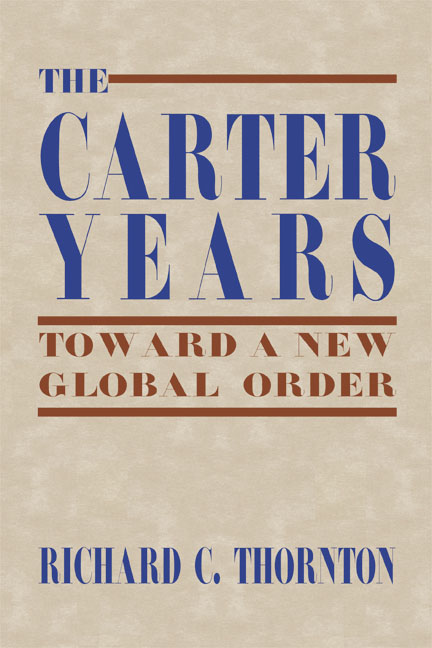Richard C. Thorton
Although Jimmy Carter came to office fully prepared to carry forward the general strategy of a new global order initiated by Henry Kissinger in 1973, his administration immediately encountered a Soviet Union embarked upon a multi-pronged geopolitical offensive, backed by a major advance in strategic weaponry, which threatened to undermine America’s global position. Recognition of the Soviet offensive forced a reconsideration of American strategy, splitting the new administration. .
Secretary of State Cyrus Vance insisted that the strategy of a new global order, whose prerequisite was detente with the Soviet Union, remained viable. National Security Adviser Zbigniew Brzezinski, on the other hand, argued that a temporary return to some modified form of containment was necessary. President Carter, caught between the diametrically conflicting advice of his principal advisers, vacillated-at times supporting the views of one adviser, then the other. Even though Secretary Vance generally prevailed, the result was that indecision and vacillation marked the foreign policy of the Carter years.
Written by a leading expert in the field of history and international affairs, readers will gain a deeper appreciation for the forces at work during the Carter years and how decisions made during that time influenced US history.
Table of Contents
PREFACE
PART 1. Toward A New Order
1. The Carter Administration Probes Soviet Intentions
The Initial Approach to Moscow
The Unanticipated Problem of
Minuteman Vulnerability
Washington Offers Moscow an Unpalatable Choice
The Moscow Meetings and Afterwards
Proceeding with Arms Control–Negotiations without Agreement
2.Reinforcing the European Flank–1977-1979
The Alliance Dilemma: Cohesion or Competition?
United States-West German Crisis and West European Monetary Unification
Franco-German Cooperation–The French Gamble
Reinforcing Western Europe–The German Question
Washington Shifts from Short to Long
German Agreement–With Reservations
3. Contradiction and Conflict in Asia–1977-1978
The Impact of the Soviet Breakthrough on United States Asian
Strategy
Washington Bluffs to Prod Japan
Early Normalization with China and Korean Withdrawal
No Normalization and No Withdrawal
Moscow Takes the Geopolitical Offensive
War in Indochina and Sino-American Normalization
United States Negotiating Strategy and Chinese Domestic Politics
4. The Middle East to the Horn of Africa: From Whipsaw to Backlash,
1977
Initial Decisions: The February 23 NSC Meeting
Accelerating the Pace of Conflict in the Horn
Building the Conditions for Israeli-Egyptian Negotiations
Conflict Erupts in the Horn of Africa
Menachem Begin Visits Washington
Crisis in the Horn, Breakthrough in the Middle East
Closing Off the Geneva Track and Going Public
Policy Failure in the Middle East
Soviet Backlash in the Horn of Africa
5. Growing Strategic Doubt and Policy Vacillation: 1978
Carter Sides with Brzezinski: The Decision to Ride the Whirlwind
SALT II Delay, Afghan Coup, and China Card
Secretary Vance Regains Control
Moscow Presses the Geopolitical Offensive
Soviet Policy, SALT II, and American Strategy
The Camp David Summit
PART II. Strategic Disintegration and Collapse
6. The Unraveling of American Strategy: SALT II and Iran
SALT As Deterrence Diplomacy
Moscow Eludes Commitment
The Failure of SALT As Deterrence Diplomacy
The United States and Iran
Containment and Disengagement in Iran
The Carter Leadership in Disarray
The Failure of Vance’s Attempt to “Broaden the Base”
Neither Coalition, Military Coup, nor Bakhtiar
7. Crisis and Failure in Asia and the Middle East: 1979
The Struggle to Construct a Foundation in the Middle East
Sino-American Normalization and the Road to War
Moscow Probes Washington’s Intentions
War, and Wider War, but No Deterrence
The Erosion of Washington’s Leverage in the Middle East
The Retreat from Camp David
The Failure to Win Over Saudi Arabia
The Egyptian–Israeli Treaty and Its Costs
8. SALT II, Cuba, and Central America: The Pursuit of Illusion
The United States and Central America
America’s Failure in Nicaragua
The Promise of Detente and Nicaragua Policy
The Cuban Impediment to Detente
The Vienna Summit
The Soviet “Combat” Brigade in Cuba
Posing the Question to Moscow
Moscow’s Rejection and Secretary Vance’s Response
President Carter’s Unsatisfactory Compromise
9. No End of Crises: A Strategy in Disarray
Replaying the Energy Card: The 1974 Oil Crisis Redux
Shortage in a Time of Plenty
Carter Attempts to Salvage a Failed Policy
Crises in Southwest Asia
Hostage Seizure and Washington’s Response
Moscow Moves Its Queen: The Invasion of Afghanistan
10. After Afghanistan: From Fiasco to Fiasco
The Ambivalent Response to Afghanistan
The Gamble to Restore United States-Soviet Amity
The Consequences of Self-Deception
The Failure of the Hostage Rescue Mission
The Response to the Mariel Boatlift
Nicaragua and El Salvador: Carter’s Election Dilemma
The Iran-Iraq War, and Begin’s Revenge
The Response to Continuing Inflation
CONCLUSION
INDEX
RICHARD C. THORNTON is professor of History and International Affairs at the Elliott School of International Affairs of The George Washington University in Washington, D.C. A frequent commentator on current issues, Professor Thornton has served as a consultant to the U.S. Department of State, lecturer around the world for the United States Information Agency, and as a reserve officer for Air Force Intelligence, retiring as a lieutenant colonel.
Professor Thornton has written numerous books and articles on American foreign policy and international affairs, including: The Nixon-Kissinger Years: Reshaping America’s Foreign Policy; China: A Political History, 1917-1980; Soviet Asian Strategy in the Brezhnev Era and Beyond; Is Detente Inevitable?; Soviet Strategy in the Vietnam War; and Detente II--SALT III: American Dream or Nightmare?






